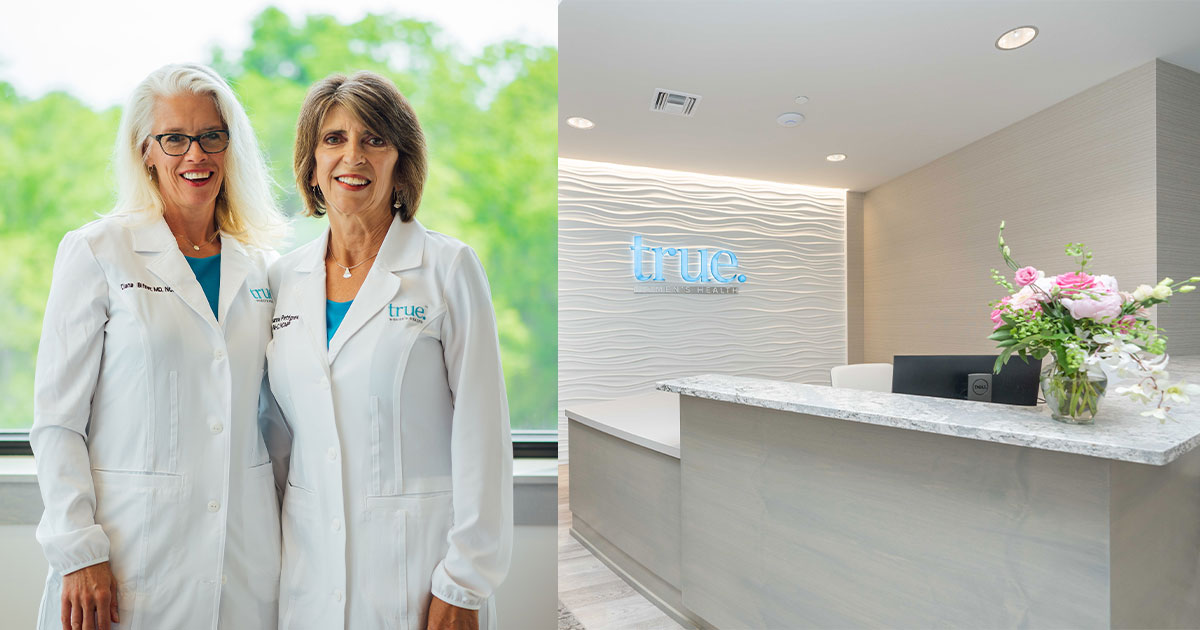Just like every other body part, women experience changes in their most intimate body areas because of changing hormones. The symptoms do not occur because of anything you did or did not do. Events in a woman’s life, such as vaginal childbirth, menopause, taking the birth control pill, having a hysterectomy, radiation treatment or chemotherapy, can affect the health and function of vaginal and surrounding tissue. These events can cause symptoms such as vaginal dryness, discomfort, painful intercourse, and/or urinary or rectal incontinence. The good news is that women no longer have to suffer in silence!
WHO DOES VAGINAL DRYNESS IMPACT?
You might think this is a problem only experienced by older women, but it happens to women of all ages—even young women in their late teens and 20s. At true. Women’s Health, we have been able to help women of all ages who have struggled with vaginal dryness and related symptoms.
- A 23-year-old leukemia survivor.
- A 42-year-old with dryness and itching with undiagnosed lichen sclerosus.
- A 25-year-old who is on a low-dose estrogen birth control pill and has chronic bacterial vaginosis.
- A 36-year-old who has experienced chemotherapy-induced menopause.
- A 46-year-old who had surgery for severe endometriosis and had to have her ovaries and uterus removed and with untreated symptoms.
- A 55-year-old who experienced natural menopause.
- An 80-year-old patient who wanted to start dating again.
As you can see, it doesn’t matter what age you are. Vaginal dryness can happen because of several different causes.
GENITOURINARY SYNDROME OF MENOPAUSE (GSM)
While vaginal dryness does not start at a certain age, it is most common in women in late menopause or five years after the last period. The term that encompasses the changes from low estrogen, including vaginal dryness, is the Genitourinary Syndrome of Menopause (GSM). As the name implies, low estrogen levels affect the tissues around the vaginal opening, base of the bladder and bladder opening, and walls of the vagina. Estrogen keeps the vaginal skin healthy and thick with functional glands which make lubrication, blood vessels that provide good blood flow and allow for arousal and sexual response and support healthy bacteria to help reduce infection of the vagina and bladder. The lack of estrogen can cause the vagina to become dry, itchy and tight, leading to bleeding after sex, painful intercourse, bladder urgency and bladder infections.
Often, women who have these symptoms feel isolated, ashamed, alone and unsure if it will ever get better. Many women do not know who to talk to, or they have been dismissed by a doctor who says, “That’s just part of aging. You’ll get through it.” The sad truth is many doctors, and other healthcare providers are not trained in the changes that occur with menopause and therefore are not comfortable diagnosing the cause of such symptoms or offering the available range of treatment options. GSM affects nearly 90% of postmenopausal women and will not resolve on its own. While vaginal dryness is one of the most common symptoms of GSM, others include:
- Vaginal burning.
- Vaginal itching or irritation.
- Reduced vaginal lubrication and reduced arousal.
- Decreased elasticity of the vagina.
- Impaired sexual function.
- Pain during penetrative sex.
- Key-in-the-lock bladder leaking.
- Increased risk of vaginal and bladder infections.
TREATMENT OPTIONS FOR GSM AND VAGINAL DRYNESS
The most important step to improving the symptoms of GSM is to understand what and why you are having the symptoms. This starts with a visit to a healthcare provider who is trained, knows what to look for, and can explain things in terms that make sense to you. It is also important to have a provider who can give you some language to help you talk to your partner about painful sex or why you have to go to the bathroom so often. Treatment is not just about getting rid of the symptoms but also repairing the months or years of misunderstanding and sense of loss that can occur because of the symptoms.
For mild symptoms and no or very rare bladder infections, an over-the-counter treatment such as a lubricant or moisturizer works well.
Lubricants: A lubricant is a product to be used in the moment of a symptom, such as sexual activity or if irritation after working out on a spin cycle. Our providers at true. Women’s Health will suggest natural lubricants (coconut oil or water and aloe-based lubricants) such as Good Clean Love®. Silicone-based lubricants like Uber Lube® are also safe.
Moisturizers: These are used on a regular basis; usually, twice per week is best. Only a small amount is needed. The brand true. providers recommend Good Clean Love®, and one type also contains hyaluronic acid, which helps add moisture to the skin layer.
For moderate to severe symptoms, especially if associated with frequent bladder or vaginal infections, moisturizers and lubricants are usually ineffective. Fortunately, effective and safe solutions are available and improve symptoms within two weeks. These include:
Local (Vaginal) Estrogen: Prescription vaginal estrogen medication can reduce symptoms within 14 days, and maximum effect is reached by several months. These are medications you could use your entire life, avoiding even life-threatening kidney infections, which can follow the most innocent bladder infection. Vaginal estrogen has little to no absorption into your system and is available in two brands of cream, an insert of estrogen dissolved in coconut oil, and a ring.
Vaginal DHEA: DHEA is not effective as an oral pill or supplement but is very effective for GSM when inserted in the vagina. We now have FDA-approved DHEA available for daily use, which also has been shown to not be absorbed into the system.
Systemic Estrogen Medication: Estrogen medication that is bioidentical and FDA-approved is safer than most women think. There are clear guidelines to help you and your provider decide if it is safe for you and is very effective for GSM and related symptoms. This medication is available in a patch or pill, and if you have not had a hysterectomy and if you take estrogen, you must also take FDA-approved progesterone.
CO2 Laser therapy: The MonaLisa Touch® is a fractional CO2 laser that has been proven effective in improving the symptoms of vaginal dryness, painful intercourse and bladder urgency. It is the only such treatment that has been studied against a placebo, and has been shown in clinical studies to be as effective as estrogen in helping stop the suffering of women from GSM when following the guidelines of three treatments in the first year, four to six weeks apart, and annually thereafter.
The MonaLisa Touch® laser works by stimulating collagen production in the vaginal tissue, improving elasticity. The treatment also stimulates the new growth of small blood vessels and improves blood supply and lubrication, often restoring normal pH levels and supporting healthy bacteria growth. It is a non-surgical, minimally invasive procedure performed in our office that takes a few minutes to complete and is performed using a wand-like device that delivers the laser energy to the vaginal tissue. Treatment with MonaLisa Touch® is relatively painless and does not require a lengthy recovery period. Most women can return to their normal activities immediately after the procedure. The typical regimen is three treatments approximately four to six weeks apart. We recommend having a yearly treatment after that to maintain your results.
The important takeaway message is there is no reason to suffer in silence with the inevitable symptoms of menopause. Nine in ten women will have symptoms that affect their quality of life, and yet not many women will discuss it, even with their best friends, sisters and sexual partner.
Regardless of the treatment you choose, please talk about it with a healthcare provider who knows. Healthcare providers cannot know everything; if yours is not comfortable talking about menopause or GSM, ask for a referral to a doctor who does. At true. Women’s health, we work with your doctor or healthcare provider to find the best solution for you and we can talk with you about any of these treatments and together find the best way forward with the best option that most suits you. We can help you get back to living your best life.
You can learn more about the MonaLisa Touch® laser during an intimate conversation about vaginal health at the true. Women’s Health clinic in Grand Rapids on February 21st at 5:30 p.m. Meet and ask questions with Certified Menopause Practitioners Susanne Pettigrew, PA-C, NCMP, and Diana Bitner, MD, NCMP, FACOG. Space is limited! Attendees will automatically be entered to win a free MonaLisa Touch® treatment and have an opportunity to purchase a discounted treatment package at the event.
Register by clicking here.
Courtesy of true. Women’s Health.
Photos Courtesy of true. Women's Health.




